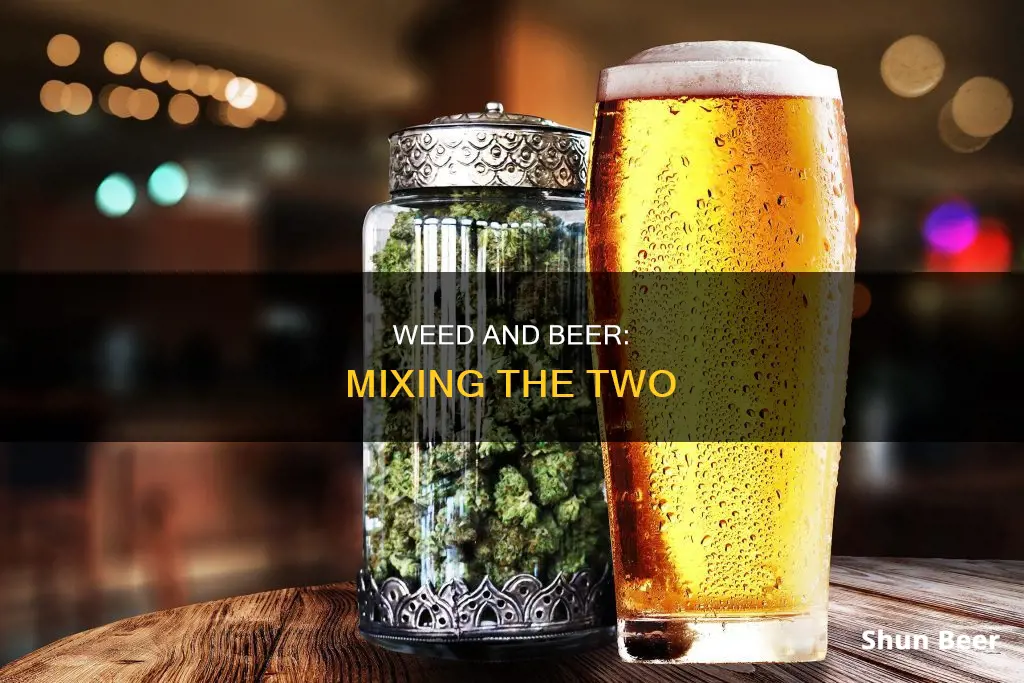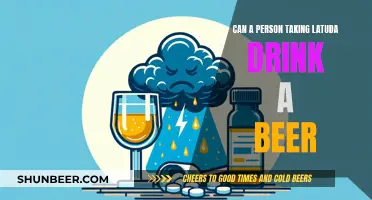
Alcohol and weed are two of the most commonly used substances in the world and are often used together. While it may not lead to major health problems, mixing the two can lead to a range of side effects such as dizziness, sweating, nausea, and vomiting. It can also cause a green out, which refers to a range of unpleasant physical symptoms resulting from a strong high. Additionally, the combination of the two substances can impair your judgment and motor control, leading to dangerous behaviours such as drunk driving, social consequences, and self-harm. It is important to be aware of the risks and to seek medical attention if necessary.
| Characteristics | Values |
|---|---|
| Effects of drinking beer and smoking weed | Heightened effects of weed, increased THC absorption, intensified adverse effects of smoking cannabis, increased impairment |
| Risks of drinking beer and smoking weed | Unpredictable behaviour, distorted senses, distorted thoughts, increased risk of overdose, increased risk of alcohol poisoning, increased risk of developing a dependence on one or both substances |
| Recommendations | Avoid using both at once, keep track of how much alcohol and weed is consumed, consult a doctor if taking medication |
What You'll Learn

Increased risk of alcohol poisoning
Combining alcohol and weed can increase the risk of alcohol poisoning. Alcohol is a depressant that impacts the central nervous system, while weed contains THC, which affects cannabinoid receptors in the brain. When consumed together, they can amplify each other's effects, including impaired judgment and increased risk of engaging in risky behaviours.
Alcohol poisoning occurs when critical parts of the brain that control breathing, heart rate, and temperature begin to shut down due to excessive alcohol consumption. The risk of alcohol poisoning is heightened when mixing alcohol with weed, as weed can slow down the rise in blood alcohol levels, delaying the sensation of intoxication. This can lead to drinking more than intended, increasing the risk of alcohol poisoning.
Additionally, alcohol widens blood vessels, allowing THC to be absorbed more quickly into the bloodstream. This increased absorption of THC can intensify the effects of weed, including anxiety, paranoia, and impaired judgment. As a result, individuals may engage in risky behaviours, such as drinking and driving, further increasing the risk of alcohol poisoning.
The combination of alcohol and weed can also lead to physical symptoms such as nausea, vomiting, and sweating, which are characteristic of "greening out." While greening out itself is not life-threatening, it can be a sign that the body is struggling to process the excess alcohol. Vomiting, in particular, helps rid the body of excess alcohol, so if weed inhibits this protective mechanism, it can increase the risk of alcohol poisoning.
Furthermore, the concurrent use of alcohol and weed has been associated with an increased risk of developing an alcohol use disorder (AUD). Those who use both substances are more likely to drink larger amounts of alcohol more frequently, which naturally increases the risk of alcohol poisoning.
Drinking Beer on 21-Day Fix: Is It Possible?
You may want to see also

Higher THC levels in the blood
When people smoke weed while drinking beer, they tend to have higher levels of THC in their blood compared to when they do not drink while they smoke. This is because the alcohol in beer widens the blood vessels, allowing THC to be absorbed much faster.
A 2015 study found significantly higher peak THC levels among participants who had consumed alcohol compared to those who had not. However, this study was small, and a similar 2010 study found that alcohol consumption did not have a significant effect on THC concentrations. Nonetheless, the alcoholic content of beer can cause THC to be absorbed more quickly, leading to higher levels of THC in the blood.
The increased absorption of THC can result in a stronger high, but it can also amplify the adverse effects of smoking cannabis. Symptoms that may be intensified include anxiety, breathing problems, headaches, impaired judgment, increased heart rate, increased appetite, hallucinations, memory problems, nausea, and paranoia.
It is important to note that the effects of mixing alcohol and weed can vary depending on factors such as individual tolerance, the type and strength of alcohol, the method of cannabis consumption, and the time interval between consuming each substance.
Beer Tube Screens: How Do They Work?
You may want to see also

Greater degree of impairment
Mixing alcohol and weed can lead to a greater degree of impairment, with both substances enhancing the effects of each other. This can result in a loss of control and even an overdose. The active ingredient in alcohol, ethanol, and the active ingredient in weed, THC, work on the same parts of the brain, affecting sexual desire and function.
The combination of the two substances can lead to distorted senses, as well as thoughts based on distorted information. Weed can impact the brain, especially areas of pleasure, thinking, sensory, memory, and time processing. On the other hand, alcohol, as a depressant, can control the central nervous system, impairing motor skills. Together, they can cause a range of adverse effects, including anxiety, breathing problems, headaches, impaired judgment, increased heart rate, hallucinations, memory problems, nausea, and paranoia.
The risk of negative outcomes is heightened when drinking alcohol before smoking weed. This sequence can increase the risk of experiencing anxiety, panic, paranoia, and other symptoms. The alcoholic content in beer widens the blood vessels, allowing for quicker absorption of THC, resulting in higher levels of THC in the blood. This combination can lead to extreme cerebral symptoms and unpredictable behaviors.
Additionally, alcohol can cause memory loss or blackouts, and when combined with weed, there is an increased risk of developing a dependence on one or both substances. Regular and frequent consumption of both alcohol and weed can lead to tolerance and addiction. Mixing the two substances can also increase the likelihood of accidents, injuries, and sexual assaults. It is important to note that the short-term dangers of mixing alcohol and weed include distorted perception of time, impaired cognitive and motor abilities, increased heart rate, and difficulty in decision-making.
Beer and Shraddha: A Spiritual Conundrum for Devotees
You may want to see also

Greening out
When a person greens out, they may experience physical symptoms such as:
- Rapid heartbeat
- Elevated blood pressure
- Nausea or vomiting
- Dizziness or lightheadedness
- Headache or migraine
- Profuse sweating
- Loss of mobility
- Paleness
The psychological symptoms of greening out can be equally distressing and may include:
- Intense anxiety or paranoia
- Panic attacks
- Feeling disoriented or confused
- Persistent feelings of unease or discomfort
- Heightened sensitivity to stimuli, such as light, sound, or touch
To manage the symptoms of greening out, it is recommended to:
- Find a calm and comfortable environment
- Practice deep breathing exercises
- Engage in grounding techniques
- Sip water slowly to stay hydrated
- Lie down and rest
- Consult with a healthcare professional if symptoms are severe or persist
To prevent greening out, it is important to be mindful of your cannabis consumption. This includes understanding the appropriate dosage for your needs, allowing significant intervals between uses, and being aware of the potency of the cannabis strain and your individual tolerance levels. Combining cannabis with alcohol or other substances can also increase the likelihood of greening out.
Mixing Beer and Adderall: What You Need to Know
You may want to see also

Unpredictable effects
Combining alcohol and weed can lead to unpredictable effects on the body and mind. Both substances have depressant effects on the brain and body, slowing down brain activity and causing effects such as slower reaction times and reduced motor coordination.
The combination of alcohol and weed can also lead to unpredictable behaviours, with research indicating that people who mix the two are more likely to engage in sensation-seeking and risky behaviours. This includes an increased likelihood of unprotected sex, as well as other negative outcomes relating to legal issues, academia, and relationships.
Mixing alcohol and weed can also distort a person's senses, including sight, hearing, smell, touch, and taste. This distortion can lead to thoughts based on inaccurate information from the surroundings, which can be dangerous.
The short-term dangers of mixing alcohol and weed include distorted perception of time, impaired cognitive ability, impaired movement, increased heart rate, inability to make important decisions, short-term memory loss, increased risk of accidents and injury, and heightened risk of sexual assault or violent attack.
The long-term dangers of mixing alcohol and weed are also significant. These include tolerance, dependence, and addiction to both substances, as well as damage to the brain and organs, including the liver and lungs. Mixing alcohol and weed can also lead to serious mental health issues such as anxiety, depression, and psychosis.
It is important to note that the effects of combining alcohol and weed can vary from person to person, and not everyone will react the same way. However, due to the unpredictable and potentially harmful effects, it is generally recommended to avoid mixing the two substances.
Monkeys and Beer: A Safe Combination?
You may want to see also







